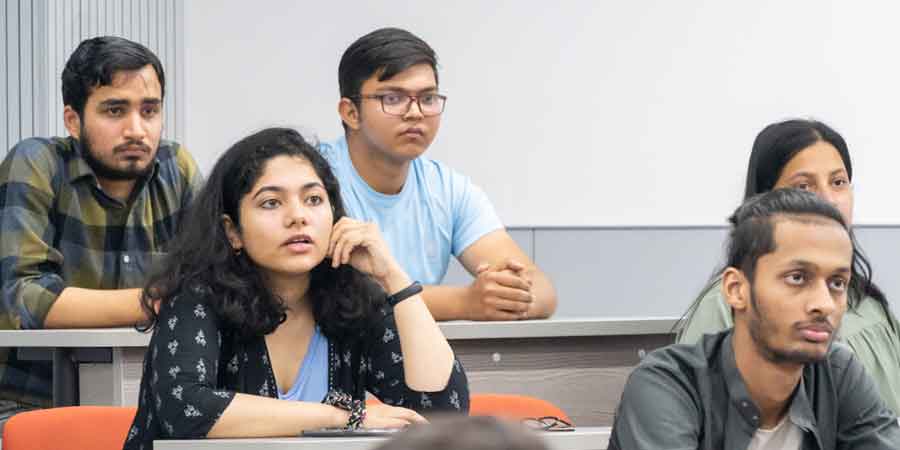Navigating the Challenges of Mathematics in College: A Student’s Perspective


Entering college marks a significant transition for many students, especially when it comes to mathematics. Whether you are pursuing a degree in mathematics, engineering, management, or any other field, encountering mathematical challenges is inevitable. However, this encounter isn’t always smooth sailing; in fact; it frequently presents significant challenges. For many college students, the journey through math courses can be riddled with challenges and roadblocks. In this blog, we will take you to some of the common problems college students face in mathematics and strategies to overcome them.
1. Conceptual Complexity: One of the primary challenges students encounter is the conceptual complexity of mathematical topics. Abstract concepts like calculus, linear algebra, and differential equations can be complex for beginners. The transition from concrete arithmetic to abstract algebraic thinking requires a shift in mindset that does not come naturally.
Solution: Break down the complex concepts into smaller, easy chunks that can help students grasp the fundamentals before moving on to more advanced topics. Exploring additional resources such as online tutorials, textbooks, or tutoring services can provide alternative explanations and reinforce understanding.
2. Problem Solving Skills: Mathematics is not just about memorizing formulas; it’s about problem-solving and critical thinking. Many students struggle with applying mathematical principles to real-world problems or unfamiliar scenarios and find themselves stuck with non-standard questions or multi-step problems. Without a clear understanding of how mathematical concepts apply outside the classroom, students struggle to stay motivated and engaged in their studies.
Solution: Practice, practice, practice! Solving a diverse range of problems is essential for honing problem-solving skills. Working through textbooks, online problem banks, or participating in study groups can help them to solve complex problems or different techniques and strategies. Additionally, seeking help from
professors or teaching assistants when encountering challenging problems can provide valuable insights. 3. Time Management: Balancing math coursework with other academic and extra-curricular activities can be challenging as math assignments require significant time and effort to complete when struggling with difficult problems.
Solution: Developing effective time management strategies is very important. Breaking tasks into smaller ones, creating a study schedule, and prioritizing assignments based on deadlines can help students to have effective time management and stay organized and focused. Learning to recognize when to ask for help or seek clarification can also prevent wasting time on fruitless efforts.
4. Fear of Failure: Fear of failure or lack of confidence in one’s mathematical abilities can affect academic progress. Mathematics has a reputation for being unforgiving; there’s often a right or wrong answer with
little room for interpretation. This fear of failure can paralyze students, leading to a lack of confidence in their mathematical abilities. The pressure to excel in math courses, coupled with the fear of making mistakes, can lead to anxiety and avoidance behavior.
Solution: Adopting a growth mindset is essential for overcoming the fear of failure. Recognizing that mistakes are an integral part of the learning process and viewing challenges as opportunities for growth can help students develop resilience and perseverance. Building a supportive network of peers, mentors and instructors and sharing constructive feedback can also boost confidence.
5. Lack of Engagement: Math courses can sometimes feel disconnected from students interests in future career goals, leading to disengagement and apathy towards the subject.
Solution: Finding relevance and applicability in mathematical concepts can increase engagement. Exploring the applications between maths and other fields can demonstrate the practical implications of mathematical theories. Additionally, incorporating real-world examples and problem-solving exercises that resonate with student’s experiences can make math more meaningful and engaging.
6. Technology Dependency: While technology can be a powerful tool for learning mathematics, it can also become a crutch for students. Relying too heavily on calculators or computational software can hinder students’ ability to develop essential problem-solving skills and mathematical intuition.
Solution: Limit the technology use. Set clear guidelines on when and how technology should be used. For example, encourage mental calculation or manual methods for certain types of problems before allowing the use of software and calculators. Incorporate hands-on activities and manipulatives to reinforce mathematical concepts. The use of visual aids can provide a tangible understanding of abstract concepts before transitioning to digital tools.
Conclusion: While navigating the challenges of mathematics in college may seem daunting, it is important to remember that dedication is the key to overcoming these obstacles. Despite the challenges, it’s essential to recognize that overcoming them is not insurmountable. Mathematics is not just about finding the right answers; it’s about developing critical thinking skills and gaining a deeper understanding of the world around us. Breaking down complex concepts, increasing problem-solving skills, managing time effectively, and embracing failure as a stepping stone to accessing and finding relevance and engagement in the subject matter, students can conquer the challenges of math and unlock the doors to a world of infinite possibilities. With patience, perseverance, and the right support systems in place, students can navigate the complexities of mathematics successfully. Encouraging a growth mindset, fostering a supportive learning environment, and providing access to resources and assistance are crucial steps in helping students overcome these challenges and thrive in mathematical pursuits.
Visit: https://www.ncuindia.edu/school/school-of-applied-sciences/
Authored By
Dr Anshu
Assistant Professor (Selection Grade)
Department of Applied Sciences
LinkedIn Profile: Dr Anshu Malhotra
Broad Research Area: Graph Theory, Data Analysis, Cryptography, Numerical Techniques, Soft Computing
